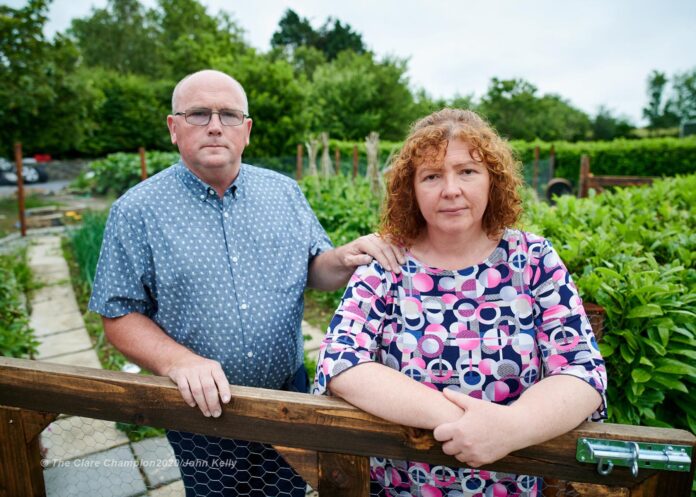A QUIN woman, with an aggressive form of cancer, has hit out at the fact that so many sick people have to fight to access life-saving treatments. Maria Meade’s oncologist has recommended a break-through drug, but currently her health insurer doesn’t automatically cover the cost for patients at her stage of illness. A year-long course of Pembrolizamub, an immunotherapy treatment, will cost at least €150,000, a price tag which Fianna Fáil Deputy Cathal Crowe compared, in the Dáil, to paying a second mortgage.
Maria and her husband Tom describe themselves as “very private people”. Speaking publicly on sensitive health issues is the last thing they would ordinarily do, but the couple said they have been left with no choice. After some physically gruelling surgery, carried out in the depths of the lockdown, Maria is cancer free. Her oncologist has told her that her best chance of staying that way is to start a course of the break-through drug, also known as Pembro. Maria is still waiting for approval from her health insurer, Laya. Insurers differ currently on their policies in terms of what cancer treatments they will fund, and at what stage of a patient’s illness.
“The situation, as I see it, is that is that if I had secondary cancers and was at Stage Three, Laya would cover the cost,” Maria explained. “Thankfully, I’m at Stage Two and am now clear of cancer. My oncologist has strongly recommended Pembro. When I told him who my insurer is, he said, ‘I’m so sorry, they won’t cover you’.”
Raising the issue in the Dáil, Deputy Crowe outlined the fact that if Maria were with VHI, she would be covered. If she were to switch insurer now, she would have to wait two years to be eligible and that is valuable time she cannot afford to waste. Given how rapidly her condition progressed, since symptoms first appeared last December, Maria, who is in her 40s, doesn’t have time to waste.
At the end of last year, Maria found what she describes as “very small scabs” on the top of her head. When they didn’t go away, she underwent a biopsy which diagnosed an aggressive melanoma. “Then the roller coaster began,” she said. “I got the diagnosis on a Thursday and had surgery the following Monday. I knew it was serious when I had to have surgery in the middle of the lockdown in April.” The risks posed by Covid-19 meant that Maria had her surgery under local anaesthetic. “That meant there were fewer people involved in the procedure and that I could go home sooner to reduce the risk of infection,” Maria explained. Infection control measures also meant that Maria’s skin-graft, which took tissue from her side, also happened at the same time as surgery on her melanomas. “I had one surgeon working on my side and the other on my head,” she outlined. “It was very traumatic. Because of Covid, Tom couldn’t come into the building. He had to drop me at the door of University Hospital Galway (UHG) and go off and wait.”
“It was an unreal scenario,” Tom added. “There was nobody around because of the lockdown, it was very eerie and very worrying.”
Thankfully, surgery was successful and follow-up tests diagnosed Maria as being at Stage Two C. with a recommendation that she start immunotherapy treatment. “When I heard about the cost [of Pembro] and thought about us covering that ourselves, I just couldn’t put the family through it,” she said. “It was only later that I had a light bulb moment and realised that if this is the medical advice, I have to follow it.”
The publicity generated by Deputy Crowe’s intervention has given the couple cause for hope. “Since the issue was raised in the Dáil, Laya have indicted that they may reconsider the situation,” Tom said. “We are hopeful, because they have asked us for letters and more details.”
In the meantime, Maria is keeping positive. “I wouldn’t have spoken out about this only for Tom,” she said. “It really is ridiculous that a sick person has to turn around and fight for treatment. It goes against the grain. If they covered the drug and let me access it now, it would save money in the long run.”
Tom added, “It really adds stress to a situation that is already stressful. We’re private people.”
A statement from Laya said the company covers Pembrolizumab, “for members being treated for certain cancers in line with clear guideline from the National Cancer Control Program”.
“Achieving the best patient outcome for our members is at the heart of our decisions when it comes to covering cancer treatments and services,” the statement said. “Laya Healthcare accepts the guidance and direction of the National Cancer Control Programme (NCCP), the National Centre for Pharmaeconomics (NCPE) and the HSE in respect of best practice guidelines for cancer treatment, adopting their policies where appropriate to ensure the best outcome for our members.”
At the time of going to print, the Meades were still waiting for a decision from Laya and have decided to proceed with treatment in the hope of securing cover.
Speaking in Dáil Éireann, Deputy Crowe said the situation regarding payment for Pembro for Maria “puts her health at great risk and puts her in fear of her life”. The Fianna Fáil member asked the minister to set up a working group in his department to consider how the drug might be made more widely available.

